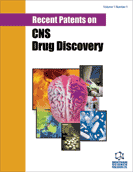Abstract
The glutamate hypothesis of schizophrenia suggests that hypofunction of N-methyl-D-aspartate (NMDA) receptors may be critical for schizophrenic symptoms; therefore, pharmacological approaches that enhance NMDA function may be beneficial for the treatment of schizophrenia. Several lines of evidence indicate that NMDA and metabotropic glutamate (mGlu) 5 receptors are closely associated signaling partners and that a selective mGlu5 receptor agonist might provide a viable approach for increasing NMDA receptor function in the treatment of schizophrenia. The orthosteric binding sites across members of the mGlu receptor subtype for a particular endogenous ligand are often highly conserved, making it difficult to achieve high selectivity for the specific mGlu5 receptor. The advanced currents of drug discovery have developed multiple highly selective allosteric modulators of mGlu5 receptor. In the present review, we provide an update of the recent patents and development of positive allosteric modulators of the mGlu5 receptor and explore their therapeutic potential for schizophrenia.
Keywords: Metabotropic glutamate (mGlu) 5 receptor, G-protein-coupled receptor (GPCR), positive allosteric modulator, potentiator, schizophrenia
Recent Patents on CNS Drug Discovery (Discontinued)
Title: Recent Patents on Positive Allosteric Modulators of the Metabotropic Glutamate 5 Receptor as a Potential Treatment for Schizophrenia
Volume: 5 Issue: 1
Author(s): Kosuke Kanuma, Takeshi Aoki and Youichi Shimazaki
Affiliation:
Keywords: Metabotropic glutamate (mGlu) 5 receptor, G-protein-coupled receptor (GPCR), positive allosteric modulator, potentiator, schizophrenia
Abstract: The glutamate hypothesis of schizophrenia suggests that hypofunction of N-methyl-D-aspartate (NMDA) receptors may be critical for schizophrenic symptoms; therefore, pharmacological approaches that enhance NMDA function may be beneficial for the treatment of schizophrenia. Several lines of evidence indicate that NMDA and metabotropic glutamate (mGlu) 5 receptors are closely associated signaling partners and that a selective mGlu5 receptor agonist might provide a viable approach for increasing NMDA receptor function in the treatment of schizophrenia. The orthosteric binding sites across members of the mGlu receptor subtype for a particular endogenous ligand are often highly conserved, making it difficult to achieve high selectivity for the specific mGlu5 receptor. The advanced currents of drug discovery have developed multiple highly selective allosteric modulators of mGlu5 receptor. In the present review, we provide an update of the recent patents and development of positive allosteric modulators of the mGlu5 receptor and explore their therapeutic potential for schizophrenia.
Export Options
About this article
Cite this article as:
Kanuma Kosuke, Aoki Takeshi and Shimazaki Youichi, Recent Patents on Positive Allosteric Modulators of the Metabotropic Glutamate 5 Receptor as a Potential Treatment for Schizophrenia, Recent Patents on CNS Drug Discovery (Discontinued) 2010; 5 (1) . https://dx.doi.org/10.2174/157488910789753512
| DOI https://dx.doi.org/10.2174/157488910789753512 |
Print ISSN 1574-8898 |
| Publisher Name Bentham Science Publisher |
Online ISSN 2212-3954 |
Related Books
 19
19Related Articles
-
Immunomodulatory Activity of MicroRNAs: Potential Implications for Multiple Myeloma Treatment
Current Cancer Drug Targets Lipid Nanoparticles for the Delivery of Active Natural Medicines
Current Pharmaceutical Design Hormones in the Mentally Disturbed Brain: Steroids and Peptides in the Development and Treatment of Psychopathology
Central Nervous System Agents in Medicinal Chemistry Does Phosphodiesterase 11A (PDE11A) Hold Promise as a Future Therapeutic Target?
Current Pharmaceutical Design Impact of Apolipoprotein E on Alzheimer’s Disease
Current Alzheimer Research Preparation and Certification of Sulfamethoxazole Reference Material by Mass Balance Method and Differential Scanning Calorimetry
Current Analytical Chemistry Modern Therapeutic Strategies for Autoimmune Diseases
Current Pharmaceutical Design Pathophysiology and Treatment of Diabetic Peripheral Neuropathy: The Case for Diabetic Neurovascular Function as an Essential Component
Current Diabetes Reviews Virulence Factors of Helicobacter pylori: Practical Biomarkers
Recent Patents on Biomarkers Editorial - Coping with Neuropathic Pain: Do We Need More Selective Analgesic Drugs?
Current Pharmaceutical Design The Role of PKR as a Potential Target for Treating Cardiovascular Diseases
Current Cardiology Reviews Human Tooth Germ Stem Cells Preserve Neuro-Protective Effects after Long-Term Cryo-Preservation
Current Neurovascular Research Calcium Channel Blockers in the Management of Hypertension in the Elderly
Cardiovascular & Hematological Agents in Medicinal Chemistry Synthesis and Biological Activity of Novel N-glucosides Containing Substituted Piperazine Moiety
Letters in Drug Design & Discovery Immune Response, Anaemia and Oxidative Stress in Trypanosoma brucei brucei Infected Rats Fed Vitamin E Supplemented Diet
Anti-Infective Agents What Fans the Fire: Insights into Mechanisms of Leptin in Metabolic Syndrome- Associated Heart Diseases
Current Pharmaceutical Design Postponing Motherhood: A Demographic and Contemporary Issue
Current Women`s Health Reviews Radioligands for the PET Imaging of Metabotropic Glutamate Receptor Subtype 5 (mGluR5)
Current Topics in Medicinal Chemistry Drug-Induced Hypokalaemia
Current Drug Safety Targeted Tumor Immunotherapy: Are Vaccines the Future of Cancer Treatment?
Current Drug Therapy






















